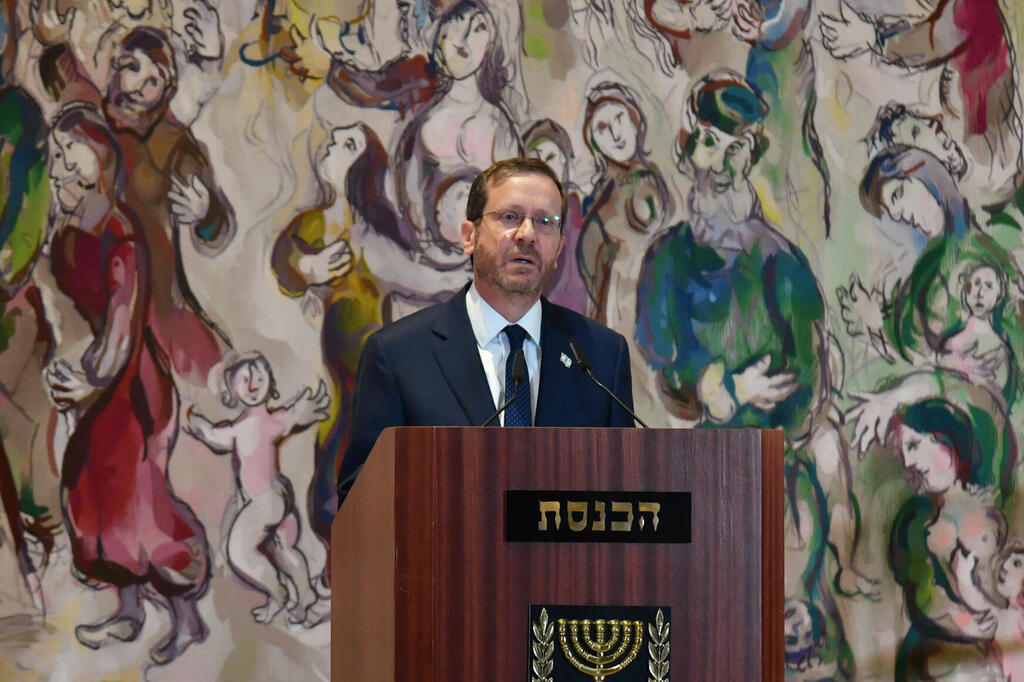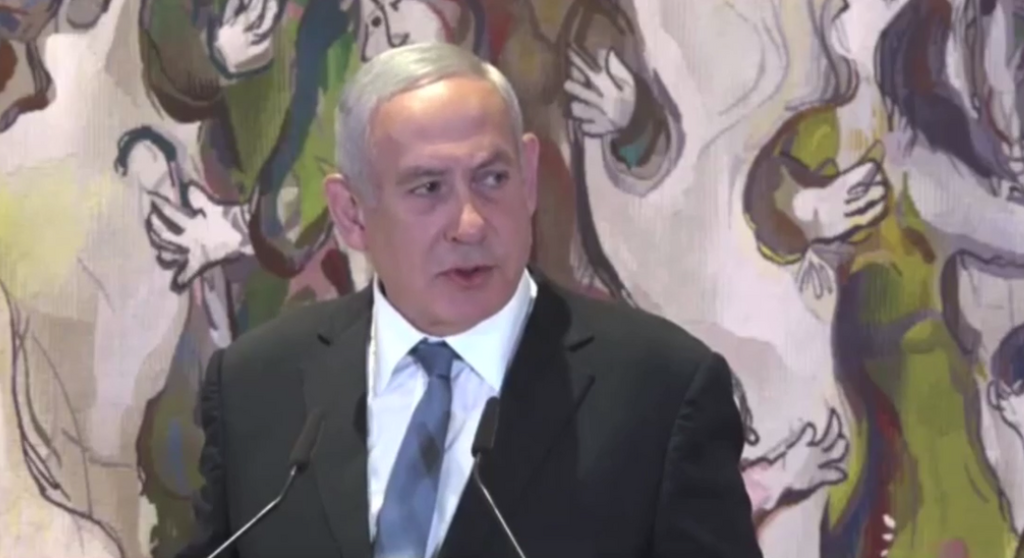One by one, senior state officials took to the podium Thursday morning at the annual "Unto Every Person there is a Name" state ceremony at the Knesset's Chagall State Hall to honor the memory of relatives and other victims who perished in the Holocaust.
First spoke Prime Minister Naftali Bennett, who told the story of the grandfather of his wife Gilat.
5 View gallery
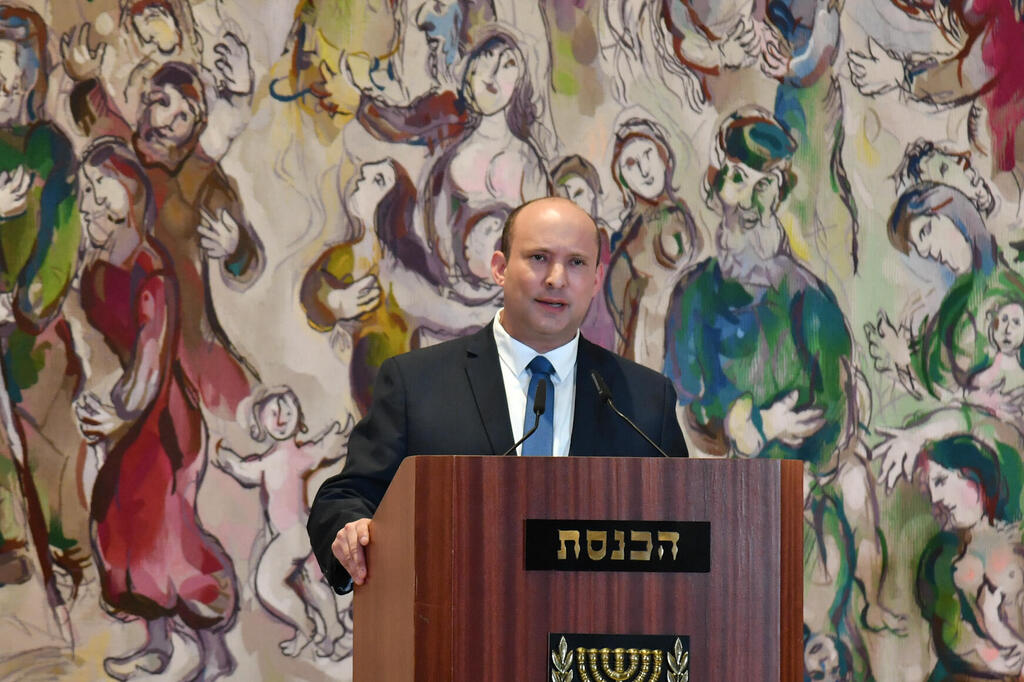

Prime Minister Naftali Bennett speaks at the annual 'Unto Every Person there is a Name' ceremony in the Knesset
(Photo: Yoav Dudkevitch)
"Grandfather Eli was 15, eldest son to his mother Gietel and father Moshe Rudsienak, and he had two younger brothers, Saul and Jacob. After the first ten days of World War II, the Germans ordered the men to gather in the town square. Eli took his father by the hand, begging him not to go: 'Dad, the Germans will kill you.' The father insisted and said 'Even in the previous war, the Germans invaded the area and called on us to pick the potatoes this season - they were totally fine'," Bennett opened his account.
"And then, the father yanked his arm from his son's grip, while his coat remained in Eli's hands. He ran toward the trucks that had already started moving and called on them: 'Wait wait, you forgot to pick me up'. This was the last Eli and his family ever saw of their father.
After the war, Eli married Clara, a beautiful Jewish woman, who was also the sole survivor of her family, and they had two sons, Moshe and David. They immigrated to Israel in 1957. My daughter Michal-Clara is named after Grandma Clara, and my daughter Abigail-Elia is named after Grandpa Eli. May their memory be a blessing."
President Isaac Herzog read out the names of family members killed in the Holocaust and shared their individual stories in brief.
"In their memory. In memory of the 10,000 Jews of the Łomża Ghetto in Poland, murdered and massacred and exiled to Auschwitz in January 1943, like lambs to slaughter. Łomża was the birthplace of my grandfather, Rabbi Yitzhak Isaac HaLevi Herzog, and where a glorious Jewish community had flourished for centuries," he said.
"In memory of the family of my late mother Aura Herzog’s uncle, the late Prof. Hersch Lauterpacht from Lviv, the only survivor from his family, who became a prosecutor at the Nuremberg Trials on behalf of the Allies and one of the founders of modern international law.
In memory of my late father Chaim Herzog’s aunt, Sonia Epstein, and of her husband and her son.
In memory of my late mother-in-law Tzvia Afek’s uncle, Yaakov Rodetsky, from the city of Ruzhany in Poland, who drowned aboard the Struma refugee ship in February 1942. In memory of the grandfather and grandmother of my late father-in-law Shaul Afek, Yaakov Meir Pinchuk and his wife Batya-Leah, from the town of Kobryn, then in Poland and now in Belarus.
In memory of Annette (Hannah) Goldberg, née Herzog, aged 21, from Paris. Annette, my father’s cousin, was captured on the border between occupied France and Vichy France and jailed at the Drancy internment camp near Paris in August 1942. The next month, Annette was loaded onto a cattle car to Auschwitz, where she was killed. She threw out of the carriage a letter, scrawled in pencil, to her mother, Aunt Esther, hiding in Paris. Farmers found the letter and smuggled it to her mother. Annette ended her letter with the words: “Do not despair, mother, do not become addicted to grief. I am full of courage and hope… There are thousands like me. Wait for me patiently, my darling mother.” Aunt Esther waited and waited for her, believing that she would return, until her dying day. May their memories be a blessing."
Opposition Leader Benjamin Netanyahu dedicated his speech to the family of his father-in-law that perished entirely in the Nazi genocide.
"My father-in-law, the late Shmuel Ben-Arzi, was a man of letters, an educator and a great teacher… He was a Bible scholar, a writer and a poet," he said.
"Shmuel immigrated to Israel as a teenager in 1933 from Poland. His father chased him to the train station and tried to persuade him not to immigrate to Israel. Shmuel made Aliyah because he was a Zionist. He would send remittances to his family but communications were severed with the outbreak of the war. My father-in-law's family from Bilgoraj, Poland, all perished in the Holocaust."
Earlier on Wednesday, Israelis stood in silence while a two-minute siren was heard across the country, in remembrance of the 6 million Jewish victims of the Holocaust.
Pedestrians stood in place, buses stopped on busy streets and cars pulled over on major highways - their drivers standing on the roads with their heads bowed.
In homes and businesses, people stopped what they were doing to pay homage to the victims of the Nazi genocide, in which a third of world Jewry was annihilated.
5 View gallery
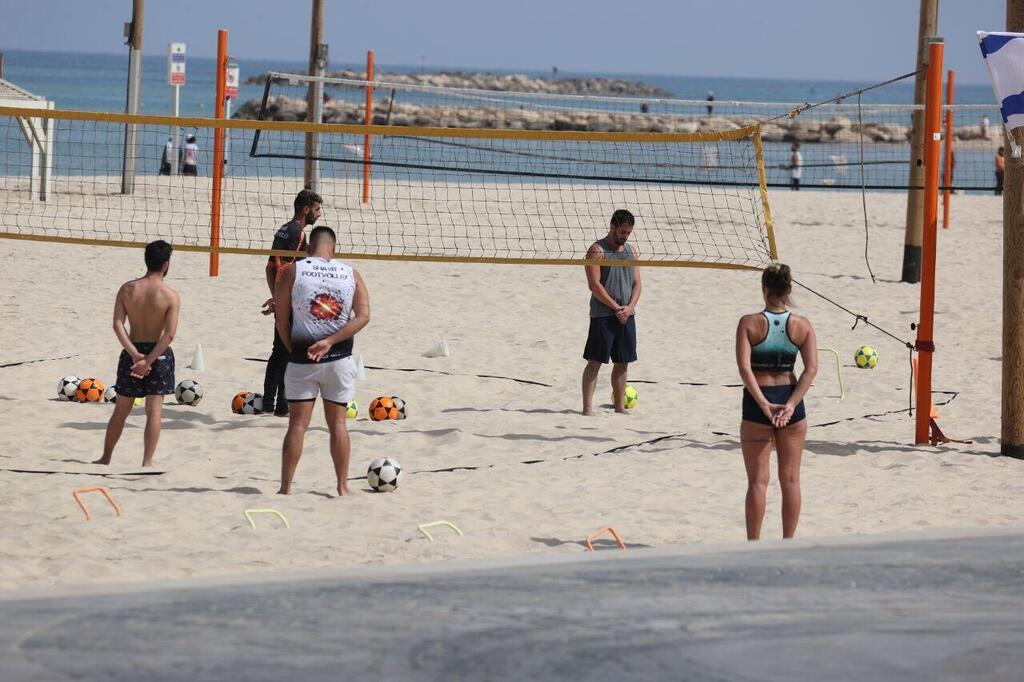

Beachgoers bow their hands and stand in sirens at a Tel Aviv beach as a siren wailed in memory of the victims of the Holocaust
(Photo: Moti Kimichi)
A wreath-laying ceremony at the Yad Vashem memorial followed, with Israeli leaders - including Prime Minister Bennett and President Herzog - as well as Holocaust survivors in attendance. Other ceremonies, prayers and musical performances took place in schools, community centers and army bases around the country.
Beforehand, President of the German Bundestag Bärbel Bas, who is on a state visit to Israel, and Knesset Speaker Mickey Levy participated in a candle-lighting ceremony in the Knesset in Jerusalem.
"I bow my head in humility and shame to the victims of the Holocaust. We must not forget and we will not forget," Bas said.
"From our historical guilt, stems a commitment. We must fight resolutely against antisemitism for all its manifestations, and we must preserve and revive the memory and pass it on to the younger generations."
The candles were placed in the Knesset lobby and Knesset members, ministers and heads of state will light candles additional candles throughout the day.
5 View gallery
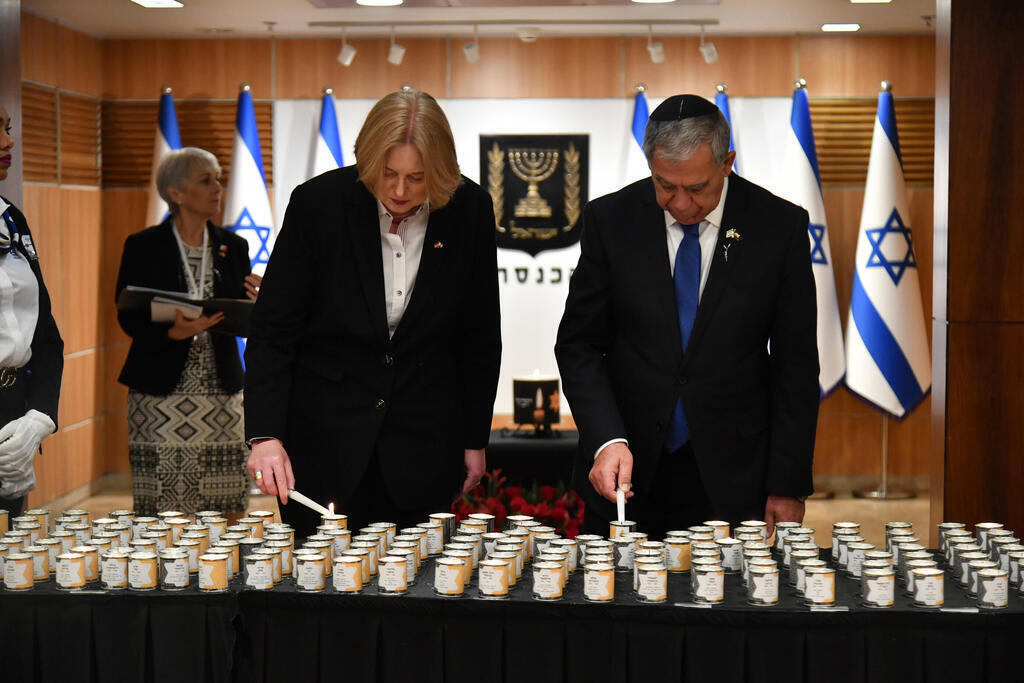

German Bundestag President Bärbel Bas and Knesset Speaker Mickey Levy at the Knesset participate in a candle-lighting ceremony in memory of the victims of the Holocaust
(Photo: Yoav Dudkevitch)
The annual remembrance is one of the most solemn on Israel's calendar. Restaurants, cafes and places of entertainment shut down, and radio and TV programming are dedicated almost exclusively to documentaries about the Holocaust, interviews with survivors and somber music. The Israeli flag flew at half-staff.
The Holocaust runs deep in Israeli public consciousness. The state was established in 1948, three years after the genocide ended with the conclusion of World War II, as a place of refuge for Jews across the world. Hundreds of thousands of Holocaust survivors who had lost their families fled there and made it their home.
According to the Hebrew calendar, Holocaust Remembrance Day marks the anniversary of the 1943 Warsaw Ghetto uprising - the most significant, yet doomed, act of Jewish resistance during the Holocaust that helped shape Israel's national psyche, symbolizing strength and the struggle for freedom in the face of annihilation.


